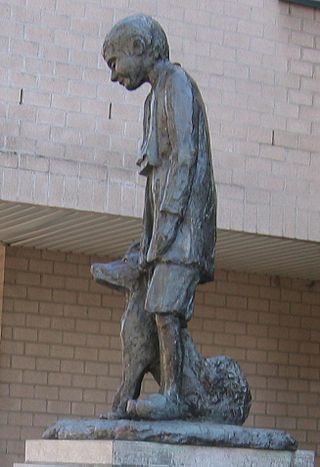
A Dog of Flanders is an 1872 novel by English author Marie Louise de la Ramée published under her pseudonym "Ouida". It is about a Flemish boy named Nello and his dog, Patrasche, and is set in Antwerp.

A Dog of Flanders is a 1960 American drama film directed by James B. Clark, with stars David Ladd, Donald Crisp and Theodore Bikel. It is based on the 1872 novel of the same name by Ouida. It was released on March 17, 1960, by 20th Century Fox in CinemaScope and Color by De Luxe.

White Shoulders is a lost 1931 American pre-Code comedy-drama film directed by Melville W. Brown and starring Mary Astor and Jack Holt, with major supporting roles by Ricardo Cortez and Sidney Toler. The film was produced and distributed by RKO Pictures. The screenplay by Jane Murfin and J. Walter Ruben was adapted from Rex Beach's short story, The Recoil.

Beyond Victory is a 1931 American pre-Code war film starring Bill Boyd, James Gleason, Lew Cody, and ZaSu Pitts. While John Robertson received directing credit, Edward H. Griffith supposedly took extensive re-takes after production ended and the film was deemed not audience ready. Two actresses with major roles in the original version were completely cut from the final release, Helen Twelvetrees and June Collyer. The original screenplay was written by Horace Jackson and James Gleason. While the film might not have made a profit at the box office, it was well received by critics.

The Crime Doctor is a 1934 American crime drama directed by John Robertson from a screenplay by Jane Murfin, adapted from the novel The Big Bow Mystery by Israel Zangwill. The film stars Otto Kruger, Karen Morley, and Nils Asther. RKO Radio Pictures produced and distributed the film which was released on April 27, 1934.

Cockeyed Cavaliers is a 1934 American pre-Code comedy film starring the comedy duo of Wheeler & Woolsey. Directed by Mark Sandrich from a screenplay by Edward Kaufman, Grant Garrett, Ralph Spence and Ben Holmes. Also featured in the cast were Dorothy Lee and Thelma Todd.

Dangerous Corner is a 1934 American mystery film directed by Phil Rosen, using a screenplay by Anne Morrison Chapin, Madeleine Ruthven, Ralph Berton, and Eugene Berton, which was based on a novel and play of the same name by J. B. Priestley. It starred Virginia Bruce, Conrad Nagel, and Melvyn Douglas.

By Your Leave is a 1934 American domestic comedy film directed by Lloyd Corrigan from a script by Allan Scott, Lewis Foster, and Sam Mintz. The screenplay was based on a play of the same name by Gladys Hurlbut and Emma B. C. Wells, which had a short run early in the year at the Morosco Theatre. The film was produced by Pandro S. Berman, and starred Frank Morgan and Genevieve Tobin, although several other actresses were initially scheduled to appear in the film, including Mary Astor and Ann Harding. Both stars were on loan to RKO from other studios. It marked the film debuts of two notable Broadway actors, Glenn Anders and Gene Lockhart, the latter of which had a lengthy Hollywood career. By Your Leave opened on November 9, 1934, and received mostly positive reviews.
Grand Old Girl is a 1935 American drama film directed by John Robertson from a screenplay by Milton Krims, John Twist, Arthur T. Horman, adapted from a story by Wanda Tuchock. The film stars May Robson, Mary Carlisle, Fred MacMurray, and Alan Hale, other cast members included Ben Alexander.
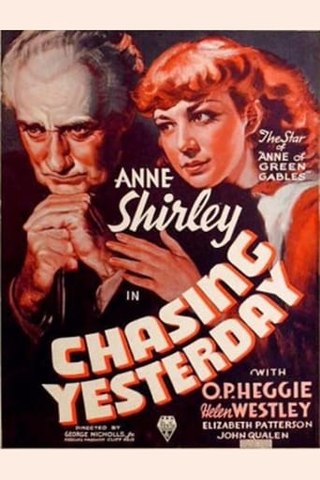
Chasing Yesterday is a 1935 American historical drama film directed by George Nicholls Jr. using a screenplay by Francis Edward Faragoh, adapted from the 1881 novel Le Crime de Sylvestre Bonnard, by Anatole France. Released on May 3, 1935, the film stars Anne Shirley, O. P. Heggie, and Helen Westley.

Freckles is a 1935 American drama film directed by Edward Killy and William Hamilton from a screenplay written by Dorothy Yost, adapted by Mary Mayes from Gene Stratton-Porter's 1904 novel of the same name. Two earlier adaptations of Stratton-Porter's novel had been produced, the first by Paramount in 1917, and the second in 1928 by FBO, both were also titled Freckles. This 1935 version was released by RKO Radio Pictures on October 4, and stars Tom Brown, Virginia Weidler, and Carol Stone.

The Farmer in the Dell is a 1936 American comedy film directed by Ben Holmes from a screenplay by Sam Mintz and John Grey, adapted from Phil Stong's 1935 novel, which was similarly titled, Farmer in the Dell. The film was premiered by RKO Radio Pictures in New York City on March 6, 1936, and released widely later that month on March 27. It stars Fred Stone, Jean Parker, and Esther Dale.
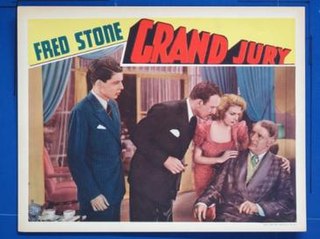
Grand Jury is a 1936 American crime drama film directed by Albert S. Rogell from a screenplay by Joseph A. Fields and Philip G. Epstein, based on a story by James Edward Grant and Thomas Lennon. Produced and distributed by RKO Radio Pictures, it premiered in New York City on July 31, 1936, and was released nationwide the following week on August 7. The film stars Fred Stone, Louise Latimer and Owen Davis, Jr.
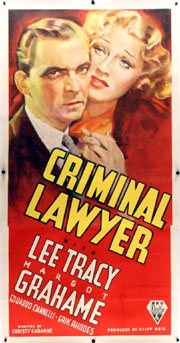
Criminal Lawyer is a 1937 American drama film directed by Christy Cabanne from a screenplay by G. V. Atwater and Thomas Lennon, based on a story by Louis Stevens. The film stars Lee Tracy, Margot Grahame and Eduardo Ciannelli. RKO produced the film and premiered it on January 26, 1937, in New York City, with a national release a few days later on January 29. It was the second time Stevens' story had been used for a film, the first being 1932's State's Attorney, starring John Barrymore and Helen Twelvetrees, directed by George Archainbaud, and also produced and released by RKO.
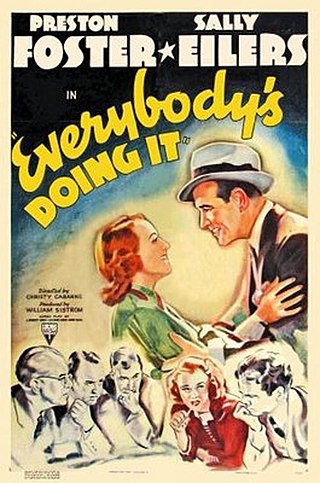
Everybody's Doing It is a 1938 American comedy film directed by Christy Cabanne using a screenplay by J. Robert Bren, Edmund Joseph, and Harry Segall, based on George Beck's story. RKO produced and distributed the film, releasing it on January 14, 1938. The movie stars Preston Foster and Sally Eilers.

Danger Patrol is a 1937 American drama film directed by Lew Landers from a screenplay by Sy Bartlett based on a story by Helen Vreeland and Hilda Vincent. Produced and distributed by RKO Radio Pictures, it was released on December 3, 1937, and stars Sally Eilers, John Beal, and Harry Carey.
Maury Cohen, also known as Maury M. Cohen, was an American film producer most active during the 1930s. He owned one of the Poverty Row studios, Invincible films, which specialized in making low-budget feature films. After leaving film in the early 1940s, Cohen founded and ran the historic dance club in Los Angeles, the Hollywood Palladium.

Samuel J. Briskin was one of the foremost producers of Hollywood's Golden Age, and head of production during his career at three of the "Big 8" major film studios: Columbia Pictures (twice), Paramount Pictures, and RKO Pictures. In the late 1950s, he was briefly on the board of directors of another major, Metro-Goldwyn-Mayer. During World War II, Briskin served in the army's Signal Corps as a film producer, attaining the rank of lieutenant colonel. After the war he co-founded Liberty Films with Frank Capra. They were later joined by William Wyler and George Stevens. The studio only produced two films, but both are now considered classics: It's a Wonderful Life and State of the Union. All three of his brothers were also film producers, as well as one of his sons, and his sister was married to the eventual Chairman of Columbia, where Briskin spent the last decade of his life as a vice-president and head of production until his death in 1968 from a heart attack.

Lee Marcus, also known as Lee S. Marcus, was an American film producer of the 1930s and 1940s. During his fifteen-year career he produced over 85 films, most of them between 1934 and 1941 while he was at RKO Studios. Prior to his production career, Marcus worked for FBO and then RKO as a sales executive, reaching the level of vice president in both organizations. At RKO, he was head of production of the studio's b-films during the late 1930s and the beginning of the 1940s. He was also responsible for producing what many consider to be the first film noir, 1940's Stranger on the Third Floor.
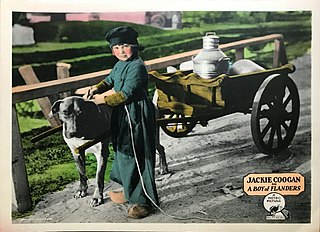
A Boy of Flanders is a 1924 American silent family drama film directed by Victor Schertzinger and written by Max Abramson. It is based on the 1872 novel A Dog of Flanders by Ouida. The film stars Jackie Coogan, Nigel De Brulier, and Lionel Belmore. The film was released on April 7, 1924, by Metro-Goldwyn.



















